Surah Rum
Contents
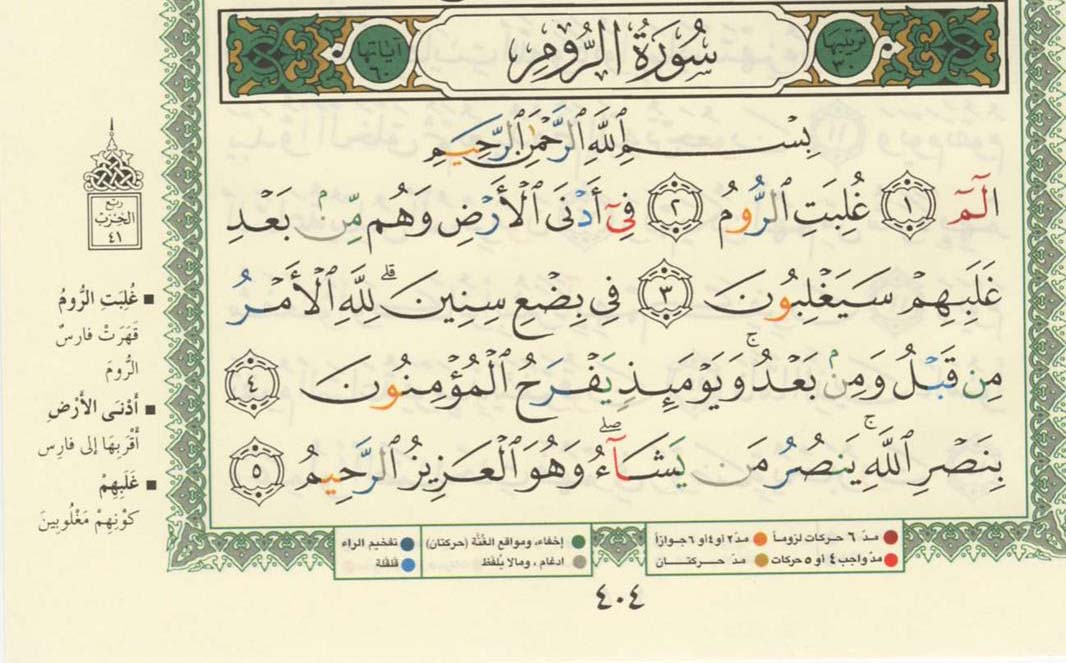
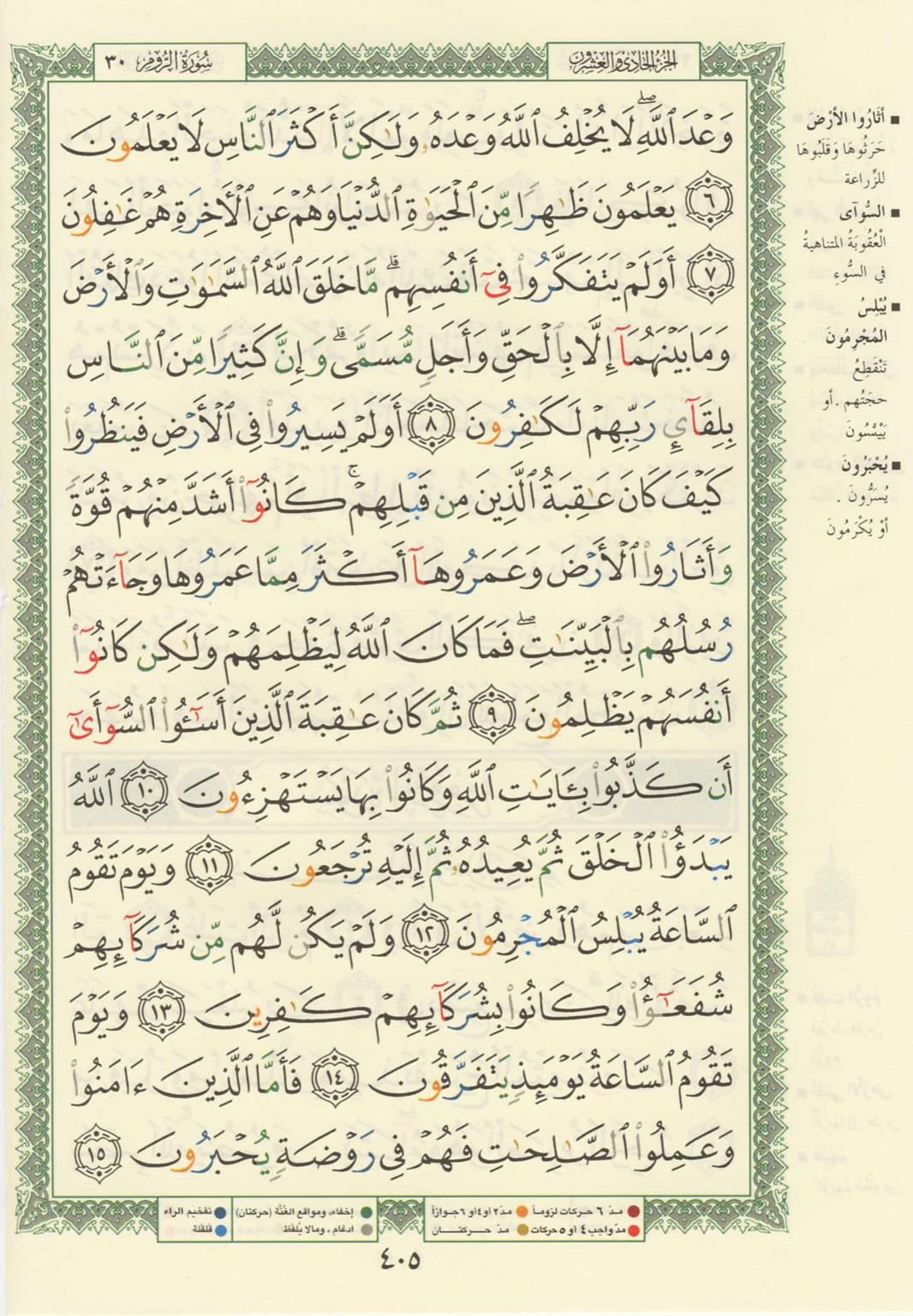
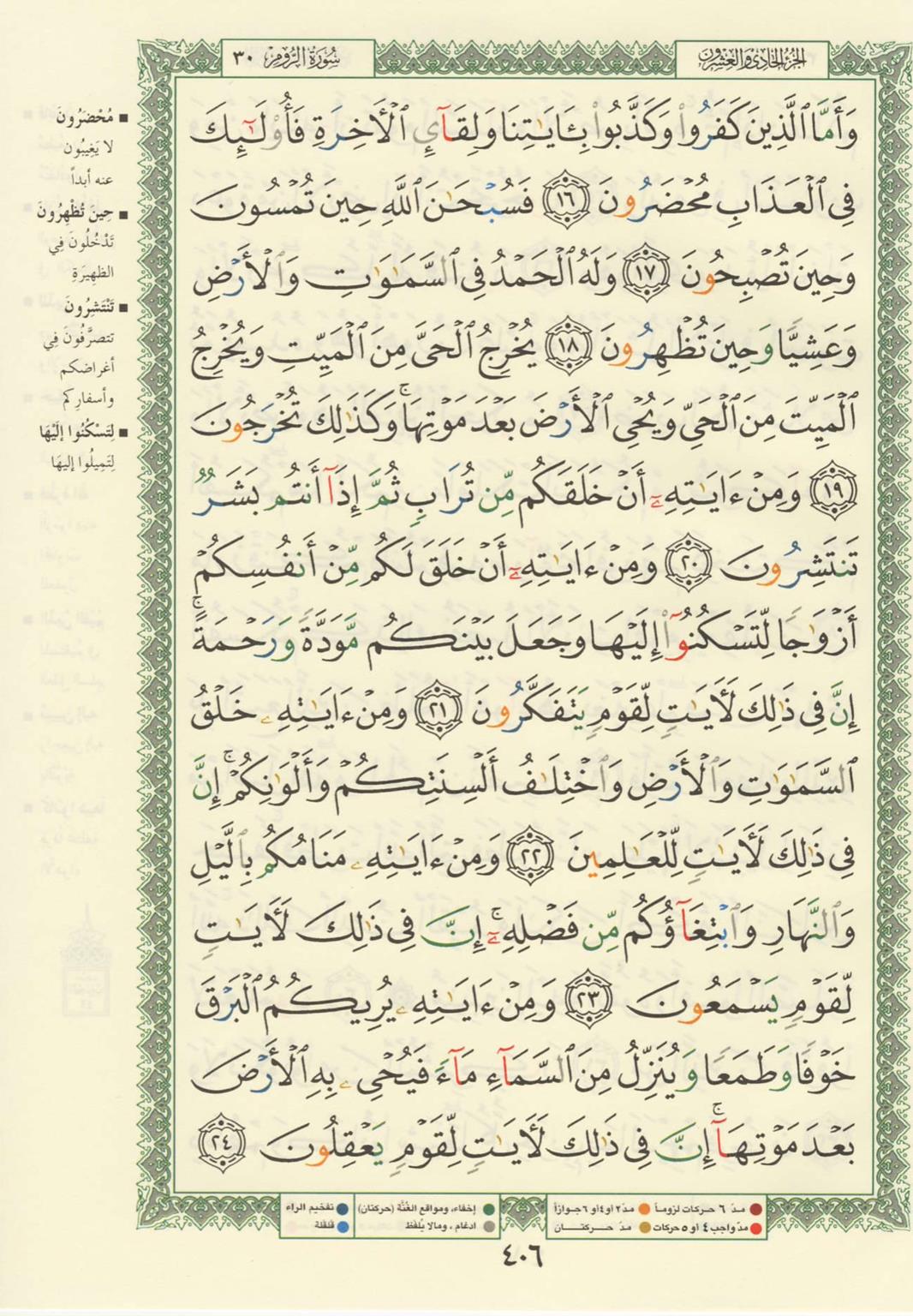
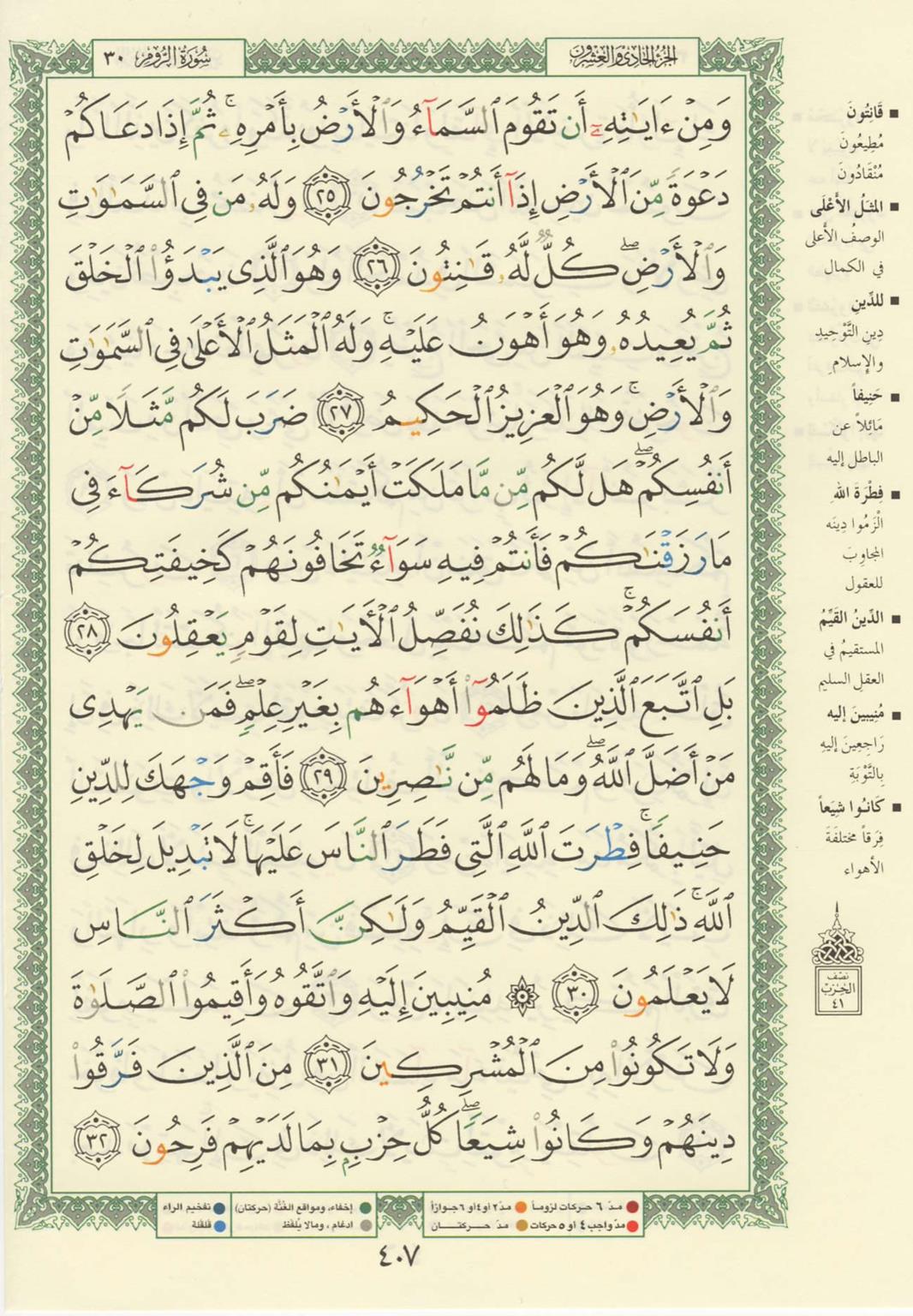
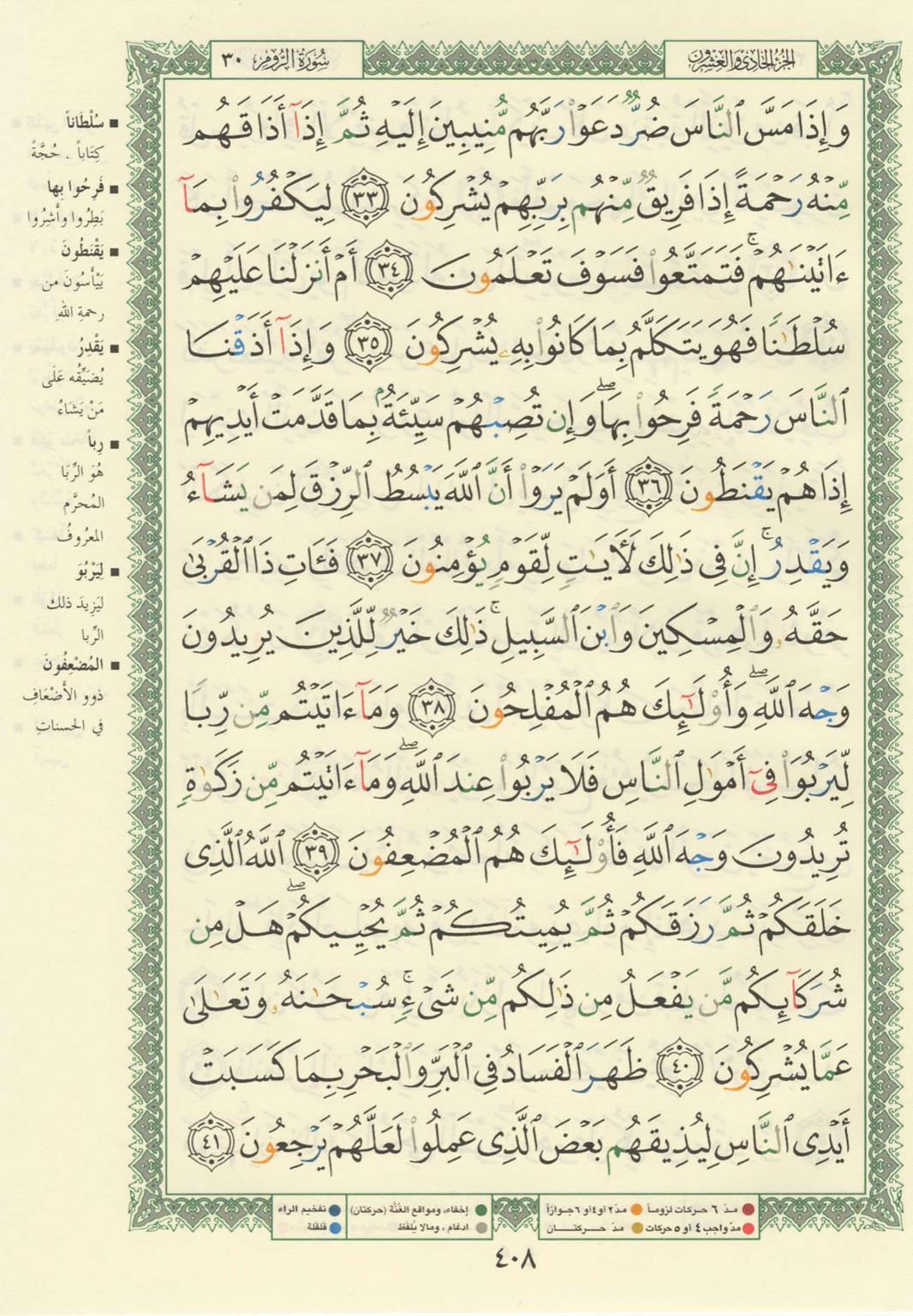
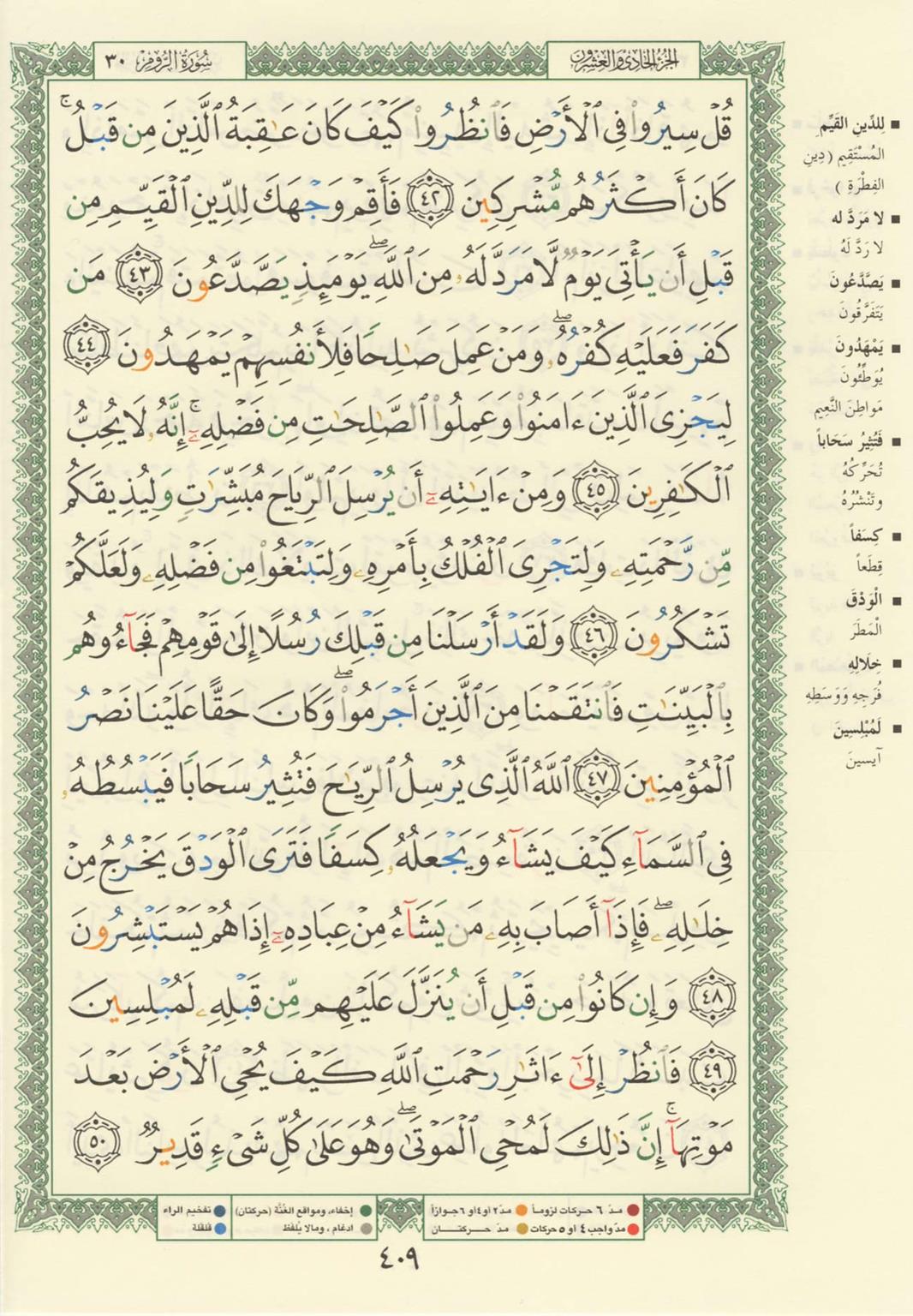
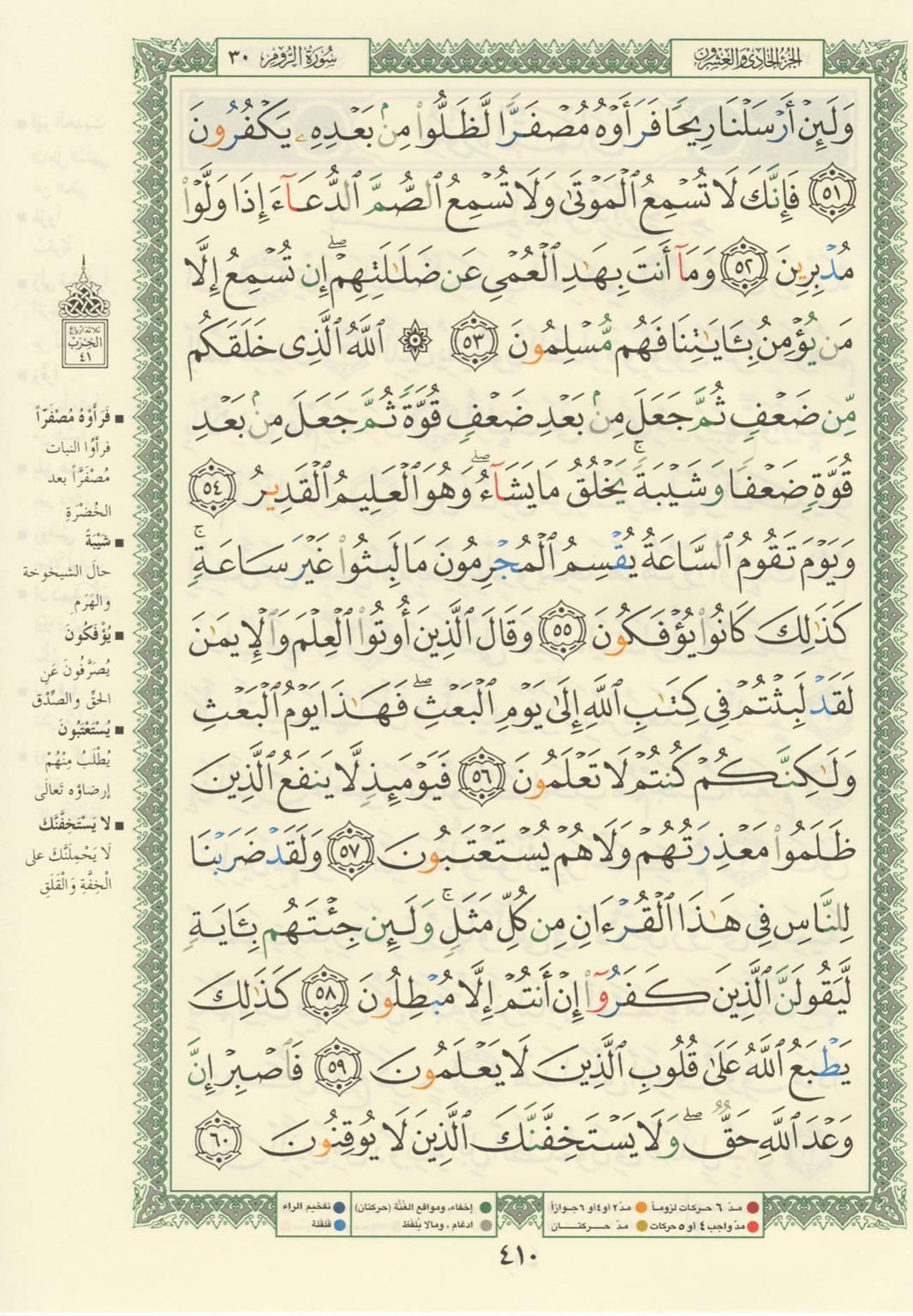
Page 404
30:1
ا-ل-م
![]() الٓمٓ
الٓمّٓ
alif-lam-meem
Alif Lam Meem.
الٓمٓ
الٓمّٓ
alif-lam-meem
Alif Lam Meem.
30:2
غ-ل-ب
![]() غُلِبَتِ
غُلِبَتِ
ghulibati
Have been defeated
غُلِبَتِ
غُلِبَتِ
ghulibati
Have been defeated
ر-و-م
![]() ٱلرُّومُ
الرُّوْمُ
r-rūmu
the Romans
ٱلرُّومُ
الرُّوْمُ
r-rūmu
the Romans
30:3
ف-ي
![]() فِيٓ
فِیْۤ
fī
In
فِيٓ
فِیْۤ
fī
In
د-ن-و
![]() أَدۡنَى
اَدْنَی
adnā
(the) nearest
أَدۡنَى
اَدْنَی
adnā
(the) nearest
ا-ر-ض
![]() ٱلۡأَرۡضِ
الْاَرْضِ
l-arḍi
land.
ٱلۡأَرۡضِ
الْاَرْضِ
l-arḍi
land.
ه-م
![]() وَهُم
وَهُمْ
wahum
But they,
وَهُم
وَهُمْ
wahum
But they,
م-ن
![]() مِّنۢ
مِّنْ
min
after
مِّنۢ
مِّنْ
min
after
ب-ع-د
![]() بَعۡدِ
بَعْدِ
baʿdi
after
بَعۡدِ
بَعْدِ
baʿdi
after
غ-ل-ب
![]() غَلَبِهِمۡ
غَلَبِهِمْ
ghalabihim
their defeat,
غَلَبِهِمۡ
غَلَبِهِمْ
ghalabihim
their defeat,
غ-ل-ب
![]() سَيَغۡلِبُونَ
سَیَغْلِبُوْنَ
sayaghlibūna
will overcome
سَيَغۡلِبُونَ
سَیَغْلِبُوْنَ
sayaghlibūna
will overcome
30:4
ف-ي
![]() فِي
فِیْ
fī
Within
فِي
فِیْ
fī
Within
ب-ض-ع
![]() بِضۡعِ
بِضْعِ
biḍ'ʿi
a few
بِضۡعِ
بِضْعِ
biḍ'ʿi
a few
س-ن-و
![]() سِنِينَۗ
سِنِیْنَ ؕ۬—
sinīna
years.
سِنِينَۗ
سِنِیْنَ ؕ۬—
sinīna
years.
ا-ل-ه
![]() لِلَّهِ
لِلّٰهِ
lillahi
For Allah
لِلَّهِ
لِلّٰهِ
lillahi
For Allah
ا-م-ر
![]() ٱلۡأَمۡرُ
الْاَمْرُ
l-amru
(is) the command
ٱلۡأَمۡرُ
الْاَمْرُ
l-amru
(is) the command
م-ن
![]() مِن
مِنْ
min
before
مِن
مِنْ
min
before
ق-ب-ل
![]() قَبۡلُ
قَبْلُ
qablu
before
قَبۡلُ
قَبْلُ
qablu
before
م-ن
![]() وَمِنۢ
وَمِنْ
wamin
and after.
وَمِنۢ
وَمِنْ
wamin
and after.
ب-ع-د
![]() بَعۡدُۚ
بَعْدُ ؕ—
baʿdu
and after.
بَعۡدُۚ
بَعْدُ ؕ—
baʿdu
and after.
ي-و-م
![]() وَيَوۡمَئِذٖ
وَیَوْمَىِٕذٍ
wayawma-idhin
And that day
وَيَوۡمَئِذٖ
وَیَوْمَىِٕذٍ
wayawma-idhin
And that day
ف-ر-ح
![]() يَفۡرَحُ
یَّفْرَحُ
yafraḥu
will rejoice
يَفۡرَحُ
یَّفْرَحُ
yafraḥu
will rejoice
ا-م-ن
![]() ٱلۡمُؤۡمِنُونَ
الْمُؤْمِنُوْنَ
l-mu'minūna
the believers
ٱلۡمُؤۡمِنُونَ
الْمُؤْمِنُوْنَ
l-mu'minūna
the believers
30:5
ن-ص-ر
![]() بِنَصۡرِ
بِنَصْرِ
binaṣri
With (the) help
بِنَصۡرِ
بِنَصْرِ
binaṣri
With (the) help
ا-ل-ه
![]() ٱللَّهِۚ
اللّٰهِ ؕ—
l-lahi
(of) Allah.
ٱللَّهِۚ
اللّٰهِ ؕ—
l-lahi
(of) Allah.
ن-ص-ر
![]() يَنصُرُ
یَنْصُرُ
yanṣuru
He helps
يَنصُرُ
یَنْصُرُ
yanṣuru
He helps
م-ن
![]() مَن
مَنْ
man
whom
مَن
مَنْ
man
whom
ش-ي-ا
![]() يَشَآءُۖ
یَّشَآءُ ؕ—
yashāu
He wills.
يَشَآءُۖ
یَّشَآءُ ؕ—
yashāu
He wills.
ه-و
![]() وَهُوَ
وَهُوَ
wahuwa
And He
وَهُوَ
وَهُوَ
wahuwa
And He
ع-ز-ز
![]() ٱلۡعَزِيزُ
الْعَزِیْزُ
l-ʿazīzu
(is) the All-Mighty,
ٱلۡعَزِيزُ
الْعَزِیْزُ
l-ʿazīzu
(is) the All-Mighty,
ر-ح-م
![]() ٱلرَّحِيمُ
الرَّحِیْمُ
r-raḥīmu
the Most Merciful.
ٱلرَّحِيمُ
الرَّحِیْمُ
r-raḥīmu
the Most Merciful.
30:6
و-ع-د
![]() وَعۡدَ
وَعْدَ
waʿda
(It is the) Promise
وَعۡدَ
وَعْدَ
waʿda
(It is the) Promise
ا-ل-ه
![]() ٱللَّهِۖ
اللّٰهِ ؕ—
l-lahi
(of) Allah.
ٱللَّهِۖ
اللّٰهِ ؕ—
l-lahi
(of) Allah.
ل-ا
![]() لَا
لَا
lā
(Does) not
لَا
لَا
lā
(Does) not
خ-ل-ف
![]() يُخۡلِفُ
یُخْلِفُ
yukh'lifu
fail
يُخۡلِفُ
یُخْلِفُ
yukh'lifu
fail
ا-ل-ه
![]() ٱللَّهُ
اللّٰهُ
l-lahu
Allah
ٱللَّهُ
اللّٰهُ
l-lahu
Allah
و-ع-د
![]() وَعۡدَهُۥ
وَعْدَهٗ
waʿdahu
(in) His promise,
وَعۡدَهُۥ
وَعْدَهٗ
waʿdahu
(in) His promise,
ل-ك-ن
![]() وَلَٰكِنَّ
وَلٰكِنَّ
walākinna
but
وَلَٰكِنَّ
وَلٰكِنَّ
walākinna
but
ك-ث-ر
![]() أَكۡثَرَ
اَكْثَرَ
akthara
most (of)
أَكۡثَرَ
اَكْثَرَ
akthara
most (of)
ن-و-س
![]() ٱلنَّاسِ
النَّاسِ
n-nāsi
[the] people
ٱلنَّاسِ
النَّاسِ
n-nāsi
[the] people
ل-ا
![]() لَا
لَا
lā
(do) not
لَا
لَا
lā
(do) not
ع-ل-م
![]() يَعۡلَمُونَ
یَعْلَمُوْنَ
yaʿlamūna
know.
يَعۡلَمُونَ
یَعْلَمُوْنَ
yaʿlamūna
know.
30:7
ع-ل-م
![]() يَعۡلَمُونَ
یَعْلَمُوْنَ
yaʿlamūna
They know
يَعۡلَمُونَ
یَعْلَمُوْنَ
yaʿlamūna
They know
ظ-ه-ر
![]() ظَٰهِرٗا
ظَاهِرًا
ẓāhiran
(the) apparent
ظَٰهِرٗا
ظَاهِرًا
ẓāhiran
(the) apparent
م-ن
![]() مِّنَ
مِّنَ
mina
of
مِّنَ
مِّنَ
mina
of
ح-ي-ي
![]() ٱلۡحَيَوٰةِ
الْحَیٰوةِ
l-ḥayati
the life
ٱلۡحَيَوٰةِ
الْحَیٰوةِ
l-ḥayati
the life
د-ن-و
![]() ٱلدُّنۡيَا
الدُّنْیَا ۖۚ—
d-dun'yā
(of) the world,
ٱلدُّنۡيَا
الدُّنْیَا ۖۚ—
d-dun'yā
(of) the world,
ه-م
![]() وَهُمۡ
وَهُمْ
wahum
but they,
وَهُمۡ
وَهُمْ
wahum
but they,
ع-ن
![]() عَنِ
عَنِ
ʿani
about
عَنِ
عَنِ
ʿani
about
ا-خ-ر
![]() ٱلۡأٓخِرَةِ
الْاٰخِرَةِ
l-ākhirati
the Hereafter,
ٱلۡأٓخِرَةِ
الْاٰخِرَةِ
l-ākhirati
the Hereafter,
ه-م
![]() هُمۡ
هُمْ
hum
[they]
هُمۡ
هُمْ
hum
[they]
غ-ف-ل
![]() غَٰفِلُونَ
غٰفِلُوْنَ
ghāfilūna
(are) heedless.
غَٰفِلُونَ
غٰفِلُوْنَ
ghāfilūna
(are) heedless.
30:8
ل-م
![]() أَوَلَمۡ
اَوَلَمْ
awalam
Do not
أَوَلَمۡ
اَوَلَمْ
awalam
Do not
ف-ك-ر
![]() يَتَفَكَّرُواْ
یَتَفَكَّرُوْا
yatafakkarū
they ponder
يَتَفَكَّرُواْ
یَتَفَكَّرُوْا
yatafakkarū
they ponder
ف-ي
![]() فِيٓ
فِیْۤ
fī
within
فِيٓ
فِیْۤ
fī
within
ن-ف-س
![]() أَنفُسِهِمۗ
اَنْفُسِهِمْ ۫—
anfusihim
themselves?
أَنفُسِهِمۗ
اَنْفُسِهِمْ ۫—
anfusihim
themselves?
م-ا
![]() مَّا
مَا
mā
Not
مَّا
مَا
mā
Not
خ-ل-ق
![]() خَلَقَ
خَلَقَ
khalaqa
Allah (has) created
خَلَقَ
خَلَقَ
khalaqa
Allah (has) created
ا-ل-ه
![]() ٱللَّهُ
اللّٰهُ
l-lahu
Allah (has) created
ٱللَّهُ
اللّٰهُ
l-lahu
Allah (has) created
س-م-و
![]() ٱلسَّمَٰوَٰتِ
السَّمٰوٰتِ
s-samāwāti
the heavens
ٱلسَّمَٰوَٰتِ
السَّمٰوٰتِ
s-samāwāti
the heavens
ا-ر-ض
![]() وَٱلۡأَرۡضَ
وَالْاَرْضَ
wal-arḍa
and the earth,
وَٱلۡأَرۡضَ
وَالْاَرْضَ
wal-arḍa
and the earth,
م-ا
![]() وَمَا
وَمَا
wamā
and what
وَمَا
وَمَا
wamā
and what
ب-ي-ن
![]() بَيۡنَهُمَآ
بَیْنَهُمَاۤ
baynahumā
(is) between them
بَيۡنَهُمَآ
بَیْنَهُمَاۤ
baynahumā
(is) between them
ا-ل-ل-ا
![]() إِلَّا
اِلَّا
illā
except
إِلَّا
اِلَّا
illā
except
ح-ق-ق
![]() بِٱلۡحَقِّ
بِالْحَقِّ
bil-ḥaqi
in truth
بِٱلۡحَقِّ
بِالْحَقِّ
bil-ḥaqi
in truth
ا-ج-ل
![]() وَأَجَلٖ
وَاَجَلٍ
wa-ajalin
and (for) a term
وَأَجَلٖ
وَاَجَلٍ
wa-ajalin
and (for) a term
س-م-و
![]() مُّسَمّٗىۗ
مُّسَمًّی ؕ—
musamman
appointed.
مُّسَمّٗىۗ
مُّسَمًّی ؕ—
musamman
appointed.
ا-ن-ن
![]() وَإِنَّ
وَاِنَّ
wa-inna
And indeed,
وَإِنَّ
وَاِنَّ
wa-inna
And indeed,
ك-ث-ر
![]() كَثِيرٗا
كَثِیْرًا
kathīran
many
كَثِيرٗا
كَثِیْرًا
kathīran
many
م-ن
![]() مِّنَ
مِّنَ
mina
of
مِّنَ
مِّنَ
mina
of
ن-و-س
![]() ٱلنَّاسِ
النَّاسِ
n-nāsi
the people
ٱلنَّاسِ
النَّاسِ
n-nāsi
the people
ل-ق-ي
![]() بِلِقَآيِٕ
بِلِقَآئِ
biliqāi
in (the) meeting
بِلِقَآيِٕ
بِلِقَآئِ
biliqāi
in (the) meeting
ر-ب-ب
![]() رَبِّهِمۡ
رَبِّهِمْ
rabbihim
(with) their Lord
رَبِّهِمۡ
رَبِّهِمْ
rabbihim
(with) their Lord
ك-ف-ر
![]() لَكَٰفِرُونَ
لَكٰفِرُوْنَ
lakāfirūna
surely (are) disbelievers.
لَكَٰفِرُونَ
لَكٰفِرُوْنَ
lakāfirūna
surely (are) disbelievers.
30:9
ل-م
![]() أَوَلَمۡ
اَوَلَمْ
awalam
Have not
أَوَلَمۡ
اَوَلَمْ
awalam
Have not
س-ي-ر
![]() يَسِيرُواْ
یَسِیْرُوْا
yasīrū
they traveled
يَسِيرُواْ
یَسِیْرُوْا
yasīrū
they traveled
ف-ي
![]() فِي
فِی
fī
in
فِي
فِی
fī
in
ا-ر-ض
![]() ٱلۡأَرۡضِ
الْاَرْضِ
l-arḍi
the earth
ٱلۡأَرۡضِ
الْاَرْضِ
l-arḍi
the earth
ن-ظ-ر
![]() فَيَنظُرُواْ
فَیَنْظُرُوْا
fayanẓurū
and observed
فَيَنظُرُواْ
فَیَنْظُرُوْا
fayanẓurū
and observed
ك-ي-ف
![]() كَيۡفَ
كَیْفَ
kayfa
how
كَيۡفَ
كَیْفَ
kayfa
how
ك-و-ن
![]() كَانَ
كَانَ
kāna
was
كَانَ
كَانَ
kāna
was
ع-ق-ب
![]() عَٰقِبَةُ
عَاقِبَةُ
ʿāqibatu
(the) end
عَٰقِبَةُ
عَاقِبَةُ
ʿāqibatu
(the) end
ا-ل-ل-ذ
![]() ٱلَّذِينَ
الَّذِیْنَ
alladhīna
(of) those
ٱلَّذِينَ
الَّذِیْنَ
alladhīna
(of) those
م-ن
![]() مِن
مِنْ
min
before them?
مِن
مِنْ
min
before them?
ق-ب-ل
![]() قَبۡلِهِمۡۚ
قَبْلِهِمْ ؕ—
qablihim
before them?
قَبۡلِهِمۡۚ
قَبْلِهِمْ ؕ—
qablihim
before them?
ك-و-ن
![]() كَانُوٓاْ
كَانُوْۤا
kānū
They were
كَانُوٓاْ
كَانُوْۤا
kānū
They were
ش-د-د
![]() أَشَدَّ
اَشَدَّ
ashadda
mightier
أَشَدَّ
اَشَدَّ
ashadda
mightier
م-ن
![]() مِنۡهُمۡ
مِنْهُمْ
min'hum
than them
مِنۡهُمۡ
مِنْهُمْ
min'hum
than them
ق-و-ي
![]() قُوَّةٗ
قُوَّةً
quwwatan
(in) strength,
قُوَّةٗ
قُوَّةً
quwwatan
(in) strength,
ث-و-ر
![]() وَأَثَارُواْ
وَّاَثَارُوا
wa-athārū
and they dug
وَأَثَارُواْ
وَّاَثَارُوا
wa-athārū
and they dug
ا-ر-ض
![]() ٱلۡأَرۡضَ
الْاَرْضَ
l-arḍa
the earth
ٱلۡأَرۡضَ
الْاَرْضَ
l-arḍa
the earth
ع-م-ر
![]() وَعَمَرُوهَآ
وَعَمَرُوْهَاۤ
waʿamarūhā
and built (on) it
وَعَمَرُوهَآ
وَعَمَرُوْهَاۤ
waʿamarūhā
and built (on) it
ك-ث-ر
![]() أَكۡثَرَ
اَكْثَرَ
akthara
more
أَكۡثَرَ
اَكْثَرَ
akthara
more
م-م-ا
![]() مِمَّا
مِمَّا
mimmā
than what
مِمَّا
مِمَّا
mimmā
than what
ع-م-ر
![]() عَمَرُوهَا
عَمَرُوْهَا
ʿamarūhā
they have built (on) it.
عَمَرُوهَا
عَمَرُوْهَا
ʿamarūhā
they have built (on) it.
ج-ي-ا
![]() وَجَآءَتۡهُمۡ
وَجَآءَتْهُمْ
wajāathum
And came (to) them
وَجَآءَتۡهُمۡ
وَجَآءَتْهُمْ
wajāathum
And came (to) them
ر-س-ل
![]() رُسُلُهُم
رُسُلُهُمْ
rusuluhum
their Messengers
رُسُلُهُم
رُسُلُهُمْ
rusuluhum
their Messengers
ب-ي-ن
![]() بِٱلۡبَيِّنَٰتِۖ
بِالْبَیِّنٰتِ ؕ—
bil-bayināti
with clear proofs.
بِٱلۡبَيِّنَٰتِۖ
بِالْبَیِّنٰتِ ؕ—
bil-bayināti
with clear proofs.
م-ا
![]() فَمَا
فَمَا
famā
So not
فَمَا
فَمَا
famā
So not
ك-و-ن
![]() كَانَ
كَانَ
kāna
was
كَانَ
كَانَ
kāna
was
ا-ل-ه
![]() ٱللَّهُ
اللّٰهُ
l-lahu
Allah
ٱللَّهُ
اللّٰهُ
l-lahu
Allah
ظ-ل-م
![]() لِيَظۡلِمَهُمۡ
لِیَظْلِمَهُمْ
liyaẓlimahum
to wrong them
لِيَظۡلِمَهُمۡ
لِیَظْلِمَهُمْ
liyaẓlimahum
to wrong them
ل-ك-ن
![]() وَلَٰكِن
وَلٰكِنْ
walākin
but
وَلَٰكِن
وَلٰكِنْ
walākin
but
ك-و-ن
![]() كَانُوٓاْ
كَانُوْۤا
kānū
they were
كَانُوٓاْ
كَانُوْۤا
kānū
they were
ن-ف-س
![]() أَنفُسَهُمۡ
اَنْفُسَهُمْ
anfusahum
themselves
أَنفُسَهُمۡ
اَنْفُسَهُمْ
anfusahum
themselves
ظ-ل-م
![]() يَظۡلِمُونَ
یَظْلِمُوْنَ
yaẓlimūna
(doing) wrong.
يَظۡلِمُونَ
یَظْلِمُوْنَ
yaẓlimūna
(doing) wrong.
30:10
ث-م-م
![]() ثُمَّ
ثُمَّ
thumma
Then
ثُمَّ
ثُمَّ
thumma
Then
ك-و-ن
![]() كَانَ
كَانَ
kāna
was
كَانَ
كَانَ
kāna
was
ع-ق-ب
![]() عَٰقِبَةَ
عَاقِبَةَ
ʿāqibata
(the) end
عَٰقِبَةَ
عَاقِبَةَ
ʿāqibata
(the) end
ا-ل-ل-ذ
![]() ٱلَّذِينَ
الَّذِیْنَ
alladhīna
(of) those who
ٱلَّذِينَ
الَّذِیْنَ
alladhīna
(of) those who
س-و-ا
![]() أَسَٰٓـُٔواْ
اَسَآءُوا
asāū
did evil -
أَسَٰٓـُٔواْ
اَسَآءُوا
asāū
did evil -
س-و-ا
![]() ٱلسُّوٓأَىٰٓ
السُّوْٓاٰۤی
s-sūā
the evil,
ٱلسُّوٓأَىٰٓ
السُّوْٓاٰۤی
s-sūā
the evil,
ا-ن
![]() أَن
اَنْ
an
because
أَن
اَنْ
an
because
ك-ذ-ب
![]() كَذَّبُواْ
كَذَّبُوْا
kadhabū
they denied
كَذَّبُواْ
كَذَّبُوْا
kadhabū
they denied
ا-ي-ا
![]() بِـَٔايَٰتِ
بِاٰیٰتِ
biāyāti
(the) Signs
بِـَٔايَٰتِ
بِاٰیٰتِ
biāyāti
(the) Signs
ا-ل-ه
![]() ٱللَّهِ
اللّٰهِ
l-lahi
(of) Allah
ٱللَّهِ
اللّٰهِ
l-lahi
(of) Allah
ك-و-ن
![]() وَكَانُواْ
وَكَانُوْا
wakānū
and were
وَكَانُواْ
وَكَانُوْا
wakānū
and were
ب
![]() بِهَا
بِهَا
bihā
of them
بِهَا
بِهَا
bihā
of them
ه-ز-ا
![]() يَسۡتَهۡزِءُونَ
یَسْتَهْزِءُوْنَ
yastahziūna
making mockery.
يَسۡتَهۡزِءُونَ
یَسْتَهْزِءُوْنَ
yastahziūna
making mockery.

